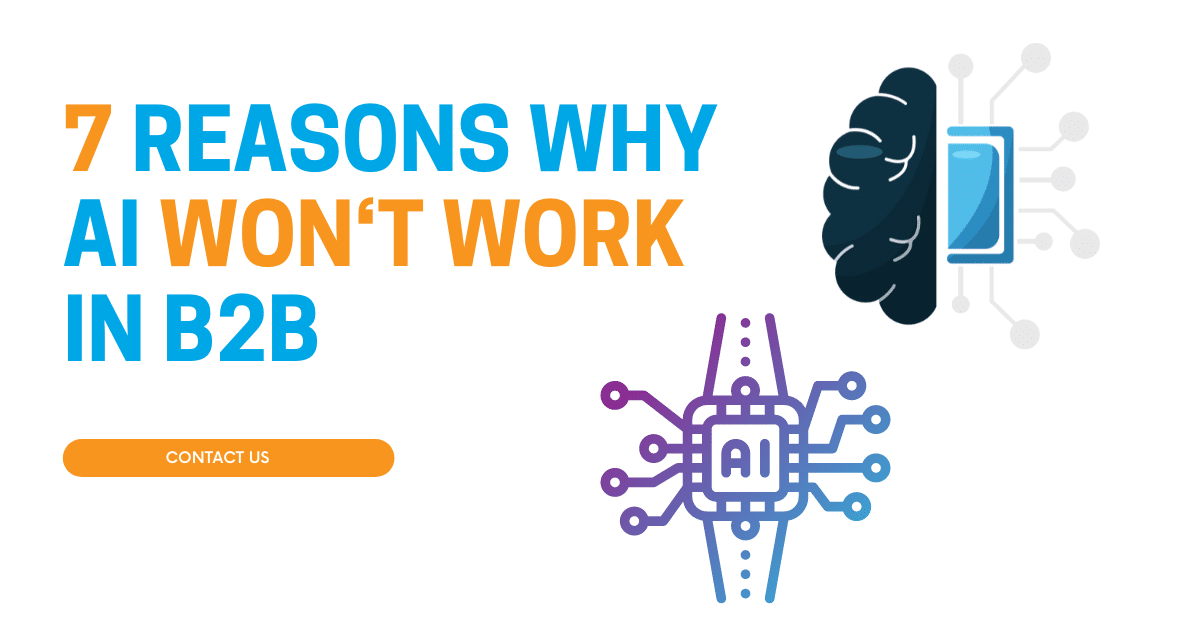7 Reasons Why AI Won’t Work In B2B Lead Generation
People have long built up artificial intelligence (aka AI) as the next big thing, creating fear of job losses, taking over operations, and even promising to revolutionize industries. Although it has caused a few ripples and stirs in many. AI has great traction in the B2C space as it has started automating tasks, bettering customer service and offering personalised recommendations. But as we move into the B2B space, that is where the hoorah dims a bit on the AI float as it doesn’t reach the expectations we thought AI would bring
We are not playing ostrich to the fact that AI will eventually be a cornerstone of businesses. However, there are several hurdles that are stopping it from making a scene in the B2B realm. This blog will look into seven reasons why AI won’t work in B2B at this moment:
Lack of Lead Gen Personalisation
The main wow factor of the AI system is its ability to process and analyse vast amounts of data. This is where it shined in the B2C sector because the consumer patterns are more or less homogeneous. But it hits a snag in the B2B realm because here it is lacking personalisation.
Not only does B2B deal with decision-making processes that are unique to each type of business and industry, there is also a complex web of interactions in the mix. You are not dealing with individual consumers, but businesses with diverse needs, purchasing cycles and procurement practices.
This nonlinearity is a huge challenge for AI to currently get over and be able to offer tailored solutions. If we take a SaaS company as an example, one that caters to a healthcare business will probably have very different requirements if we compare it to another one that is serving the finance sector. Even though the standard AI algorithms are very sophisticated (and brilliant), it still currently struggles to adapt and capture these small differences. And due to these gaps, it will for now spit out generic outputs that just don’t fit quite right with specific business needs. Also, because of the lack of personalisation it can hinder two very important components in a B2B relationship, namely trust and meaningful engagement.
AI also more often than not misses the ball on really delivering true value as it cannot give bespoke insights or recommendations, unlike an outbound agency for example. We can even take this gap in personalisation further and move from customer-facing applications to internal operations. The B2B sales force is heavily reliant on personalised lead scoring and forecasting, and AI’s cookie-cutter approach just won’t do in these areas. Even online lead generation companies are hitting the same wall with AI not personalising leads, segments or niches.
This is a real doozy of a barrier that is stopping AI from meeting the high expectations set out in the B2B sector. So, AI can only start making waves in the B2B space once it’s ever able to deliver on tailor-made solutions that can check the specific needs boxes of each business.
B2B Data Privacy Concerns
Another big reason why AI won’t work in B2B is the huge challenge of data privacy concerns. This is affecting businesses regulatory compliance and also with building client trust. The vast volume of data businesses are pushing through AI-driven applications to help with their decision-making and getting their operations streamlined is growing at an alarming rate. But the data in its huge quantities, very often do contain sensitive information like trade secrets, financial records, and customer details.
Legal and ethical questions are being raised in this regard because there is always the fear of data breaches and even misuse. As a response, strict regulations such as CCPA and GDPR enforce rigorous standards for data protection, requiring businesses to implement robust measures to safeguard information. And if businesses refuse to comply with these regulations then they will not only face a hefty fine but also irreparable damage to their company’s reputation.
So here is the current dilemma: if AI want to integrate with B2B businesses without a hitch, then it must first be able to prove to the stakeholders that their data is being handled and managed with the utmost security and transparency. It’s not as easy as it sounds. We are talking about secure data storage solutions, advanced encryption tech, and frequent audits. For transparency, the businesses must be upfront with how these AI systems will process and utilise the data, building and maintaining trust with their clients through clear communications. And just to make things a bit more difficult, that brilliant AI algorithms must also be interpretable and explainable. The clients will need to understand just how their data is being used to be able to make an informed decision.
This level of transparency is very important for ethical AI practises.
Integration Issues
Integration issues are a big concern with the B2B sector thinking of adopting AI, mainly because of the compatibility problems between the businesses existing IT infrastructure and AI systems. In the current marketplace, the majority of businesses are operating on legacy systems which might not be able to support AI techs advanced capabilities.
Getting these two puzzle pieces to fit will require an integration process with a lot of modifications to the existing software and hardware. You will have to make sure that your cushy bottom-line can take the financial hit and also be prepared for extended timelines. But wait, there is more. You might be one of the lucky companies that need to use multiple AI tools from various vendors, and these too need to communicate perfectly or else you will sit with operational silos.
It’s difficult to integrate disparate systems because there is no standardised AI tech. And then we finally get to the data – the driving force behind AI and the business world. AI loves to gobble-up data and high quantities of that. But it’s a picky eater, and only takes in high-quality data if you want to use your AI tools optimally. So to clean-up and consolidate your data to make it AI-ready is a resource-intensive and time-consuming process.
Ensure employees using AI tools are trained effectively to mitigate resistance due to job displacement fears. Clear communication in training materials is crucial. Long-term AI integration issues also involve ongoing maintenance, tech support, and costs. Continuous updating and monitoring are essential for maintaining relevance and effectiveness.
So remember to add these costs to your budget going forward.
High Costs
Speaking of budget, let’s dive into the deep end of this costly reason. As we have already touched on previously, the initial investment to get the ball rolling for AI solutions can be on the high side. This includes the expenses related to the software, hardware and also the costs of high-quality datasets. Many companies will have to go through the process of purchasing advanced commuting infrastructure. This means that will be able to handle the extensive data processing and complex algorithmic computations.
Add to that you will also need software licences for AI frameworks and tools. Upfront costs might be a chunk of change, but get ready for the ongoing expenses. With the rapidly evolving technologies, you will have to make sure your AI software keeps pace with regular updates. Also remember that you will need to have robust security too to keep your data safe from hackers. You will also need to add to your growing budget the costs of experts that will operate your AI models – say hello to data scientists, machine learning engineers and… AI masters? Could be a new profession in the very near future.
Integrating AI into your existing workflow might require some custom development, which costs you both more money and company time. There is also a high chance of unforeseen costs raining on your bottom line. Data storage can become an issue with the volume of data that’s being collected and analysed keeps growing. While there are many long-term benefits to using AI and it can possibly offset these costs, your initial and ongoing financial outlays is a big hurdle to overcome. But if you’re one of those companies that is just looking to use AI as a way of getting customers through data-driven strategies, then rather look into partnering with a lead generation company.
This is a far better and cost-effective solution to reach your goals.
Limited Understanding and Lead Gen Expertise
The knowledge gap between experts and non-experts is extremely big, especially with the insane rate AI tech is evolving. This is another reason why AI won’t work in B2B, because currently very few companies have mediocre experts in their businesses already. This makes it difficult for companies to implement AI right away in your practices because they are not able to use these tools to their full potential. Top-tier talents usually jump onboard the tech giant and specialised firms payroll, leaving small and medium-sized enterprises to paddle against the current trying to attract and retain employees with the necessary know-how.
Because the expertise required in a solid AI team is a wide range of disciples (as noted before) many companies forgo on the dream of having a full in-house team, and rather outsource it. Also it’s very easy for there to be misunderstandings or misuse because of the complexity of the AI systems. One is biased outcomes or inaccurate predictions. Beware that the more AI systems become integrated into your business’s critical processes. The more crucial the need become to have specialised employees on your payroll that can manage and interpret these systems.
An outbound agency can become the saving grace of many industries as they can bridge the gap and give you access to their pool of specialised talents.
Over Reliant on Standard Algorithms
If your business becomes over reliant on standard algorithms in AI, you can be in hot waters. That is because it can pose an ethical risk and also you risk your business going into a innovation shut-down. While many industries choose these well-tested standard algorithms by default, this over-reliance can lead to homogenized solutions. Your business’s complex or unique problems might not be addressed and solved as effectively or creatively, leading to an innovation shutdown.
Developers may find it cumbersome to create new algorithms and may opt to use ChatGPT instead. Continued use of these AI tools risks algorithms failing to adapt to market changes or new data, potentially causing business inefficiencies or failure.
Insufficient B2B Adaptability
Despite widespread use in sectors like healthcare and finance, standard algorithms often overlook current real-world dynamics. Using algorithms that fail to adapt to evolving conditions or integrate new data risks inefficiencies and failures.
The moth effect of these AI systems lacking adaptability is that your business can suffer financially. This will impact your operations making it inefficient whilst compromise all the decision-making.
Conclusion
While there is no denying that AI is and will be part of our future, it’s just not there yet for the B2B sector. AI won’t work in B2B until we bridge and sort these challenges due to the demanding and intricate nature of business-to-business interactions.
To find out more about our B2B telemarketing lead generation, and appointment setting services, contact us today at 0330 808 0866 or email us at enquiries@theleadgenerationcompany.co.uk

Ryan Whyte is the Senior Campaign Manager where he leads a team of B2B telemarketers to deliver high-quality leads for clients. With a strong background in campaign management and a focus on driving results, Ryan is dedicated to optimising strategies that maximise client success in B2B lead generation.



















